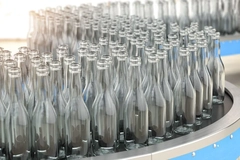Verallia and Penn State scale low-carbon glass for packaging
Key takeaways
- Verallia partners with Penn State University to commercialize LionGlass, a low-carbon alternative to traditional glass.
- LionGlass melts at tempretures 400 degrees Celsius lower than conventional glass, cutting CO2 emissions and energy use.
- The material is up to ten times stronger than conventional glass, enabling lighter, more durable, and sustainable packaging.

Verallia, a global glass manufacturer, has partnered with Penn State University in the US to scale the use of LionGlass — a new type of glass developed by university researchers for consumer packaging.
LionGlass melts at temperatures up to 400 degrees Celsius lower than conventional glass, and eliminates carbonates from the glass formula, reducing CO2 emissions.
Corinne Payen, director of glass innovation at Verallia, says: “LionGlass offers a promising alternative to conventional soda lime silicate glass. It melts at temperatures much lower than traditional glass, which saves energy and eliminates the use of carbon-based raw materials, potentially halving the carbon footprint of glass manufacturing.”
It also boasts better crack resistance and durability, and in some cases is up to ten times stronger than conventional glass, according to Verallia.

John Mauro, professor and department head of materials science and engineering at Penn State and co-inventor of LionGlass, says: “Worldwide, glass manufacturing produces over 86 million tons of CO2 annually.”
“LionGlass not only reduces emissions during production but also offers superior mechanical performance — up to ten times more crack-resistant than standard glass — which could allow for lighter packaging and further reduce transportation-related emissions.”
Energy intensive
The Science Based Targets initiative, a climate action organization, validated Verallia’s long-term Net Zero 2040 trajectory according to its Net Zero Standard.
Verallia operates 35 glass production facilities across 12 countries. It has committed to reducing its CO2 emissions by 90% and offsetting the other 10% by 2040.
Glass is often perceived as sustainable due to its ability to preserve food and beverages, and its indefinite recyclability. However, Mauro notes that traditional glass production is energy-intensive.
In an interview with Packaging Insights, André Pietzke, chairman of the Reusable Packaging Association of Germany, highlighted the importance of standardized and holistic management across the glass bottle reuse system.
According to the latest data from Close the Glass Loop, glass collection recycling rates are increasing across the EU, with previously underperforming countries improving their national glass collection streams.












